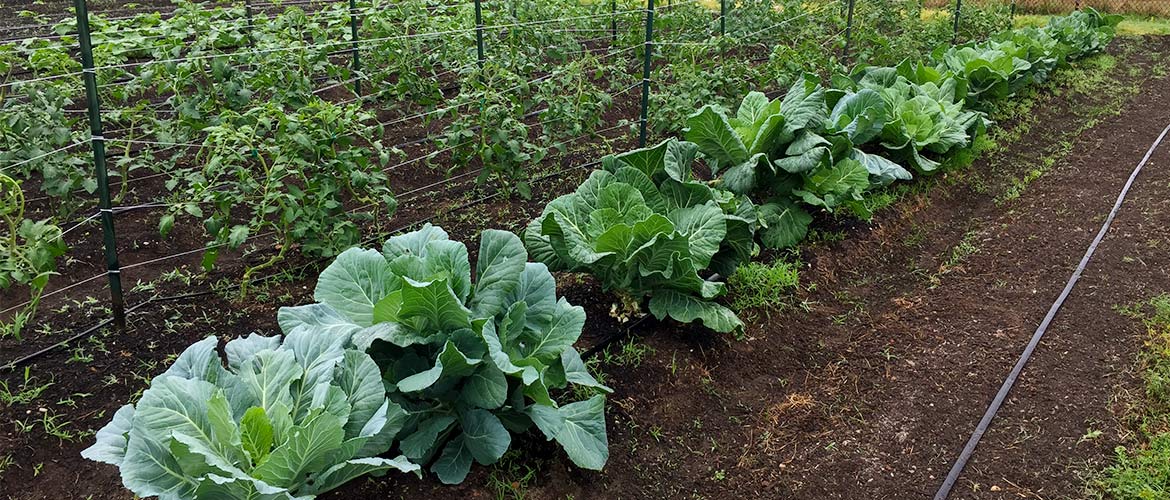Newsroom | Community Health

The campus at Lyndon B. Johnson Hospital in Houston has a farm that grows a variety of food for its Food Farmacy program. Other community partners, including those supported by BCBSTX, contribute food to the program.
Making Food Part of the Treatment Plan
For thousands of chronically ill patients, the Food Farmacy program at Harris County’s Lyndon B. Johnson (LBJ) Hospital in Houston has improved their health and helped feed their families.
The initiative, launched by Harris (County) Health System in 2018, was created to address conditions such as diabetes and hypertension. However, it’s also become a lifeline for families living in one of greater Houston’s most impoverished areas. More than half the population in Northeast Harris County — LBJ’s service area — lives at or below the federal poverty level, and an estimated 13,000 residents are food insecure, according to Harris Health, which operates the hospital.
LBJ’s campus includes a small farm that grows a variety of greens and vegetables for the Food Farmacy, and other community partners contribute food to the program to expand options. Patients receiving Food Farmacy referrals can select up to 30 pounds of free fresh produce every two weeks, receive nutrition education and take culinary classes to help them develop healthy lifestyle changes.
So far, the program has served more than 6,500 patients and helped those with diabetes improve their conditions, while reducing their families’ food insecurities.
“The idea is to help everyone in the family because they are all food insecure,” says Maria Sonsoles De La Cruz, Harris Health’s manager of care integration and population health. “Our patients are able to spend their money on other needs because we are helping provide them with food.”
With support from Blue Cross and Blue Shield of Texas (BCBSTX), Houston’s Urban Harvest, a nonprofit that has helped build and sustain more than 190 community gardens throughout the area, supplements the Food Farmacy with fruits and vegetables from its network of local farmers and ranchers.
“Urban Harvest has been proud to support the outreach work of LBJ Hospital’s Food Farmacy program,” says Janna Roberson, Urban Harvest’s executive director. “The patients and staff are always excited to see all the varieties of fruits and vegetables the bags contain. The local farmers who supply the produce also benefit from the economic support for what they do. It’s a winner’s circle for everyone."
Statewide, Urban Harvest is among the organizations collaborating with providers to increase access to the nutritious foods needed to improve patients’ health. Besides Urban Harvest, BCBSTX also has funded the Dallas-area’s Visiting Nurse Association of Texas (VNA), which contracts with providers like Methodist Health System to help improve patients’ health with nutritious food.
“These organizations demonstrate inventiveness and focus in putting together impactful programs that target disease prevention, management and nutrition,” says Sheena Payne, BCBSTX’s community affairs director. “We are confident their efforts are generating great results while helping vulnerable Texans."
Movement to reimburse nutrition programs
In the United States, chronic diseases account for 70% of all deaths, and poor diets are linked to conditions including heart disease, cancer and Type 2 diabetes. Only 10% of Americans eat enough vegetables, and just 12% eat enough fruit, according to Centers for Disease Control and Prevention (CDC).
Texas is not much better off, with only 14% of residents eating enough fruit, and nearly 12% eating enough vegetables, the CDC found.
Providers may try to encourage patients to adopt better habits and offer education on the benefits of eating a nutritious diet, but options are limited if people can’t afford to buy healthier foods or don’t have access to places that sell them.
This may be changing. In 2022, the U.S. Centers for Medicare and Medicaid Services (CMS) began permitting a few states, including Massachusetts, Oregon and Arkansas, to expand their Medicaid programs to tackle health-related social needs like nutrition access. Six more states have requested permission to use Medicaid funds for similar initiatives.
Texas has not made such a request, so providers in the state generally cannot be reimbursed for “prescribing” or providing nutrition services. However, the Texas Health and Human Services Commission recently announced plans for its Medicaid and CHIP programs to develop reimbursement models for nonmedical health drivers, including food insecurity, to improve health outcomes and reduce costs.
Meantime, BCBSTX has joined providers and community organizations to help fill the void.
“We must be part of the solution when it comes of transforming people’s lives to reduce barriers in accessing nutritious food,” says Dr. Mark Chassay, BCBSTX vice president and chief medical officer. “By addressing this crucial social determinant of health, we show we take seriously our responsibility as a leader in the health care industry to understand the broad issues that impact the health and wellness of people in our communities.”
Providing meals improves outcomes
By receiving at least one nutritious meal a day, the health conditions of hundreds of older Dallas County patients have been kept in check, preventing emergency room visits and hospital readmissions.
Several Metroplex health care providers have contracted with the VNA of Texas’ Meals on Wheels program to assist chronically ill patients at high risk for emergency care get the nourishment, as well as monitoring they need, to safely remain in their homes.
Besides dropping off meals, volunteers also perform daily assessments of clients’ conditions, determining whether they eat their meals and appear to be thriving. If a visit triggers concern, the deliverer contacts the VNA office, which reaches out to the client’s provider.
Cheryl Jones Jobe, the VNA of Texas’ donor relations director, says the program has reduced ER visits almost 70% and hospital readmissions more than 85% among Methodist patients participating in the program.
“The nutrition we deliver does make a difference,” she says, adding that with support from Blue Cross and Blue Shield of Texas (BCBSTX), the VNA is serving its clients by “helping people live with dignity and remain independent at home.”
